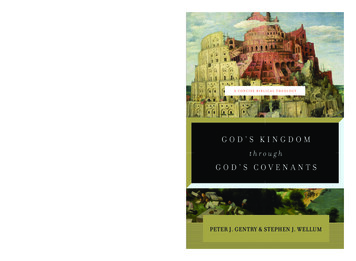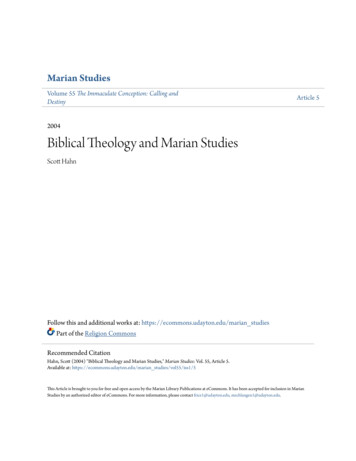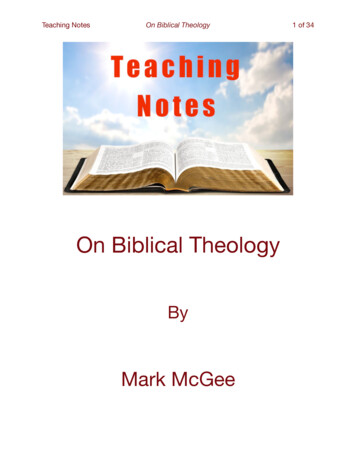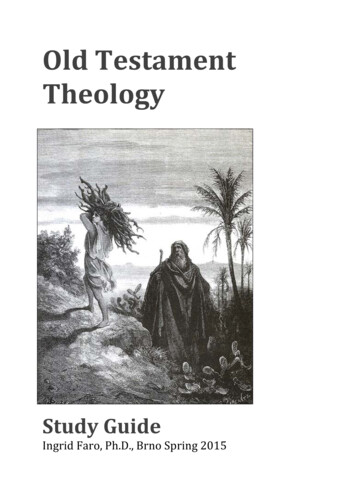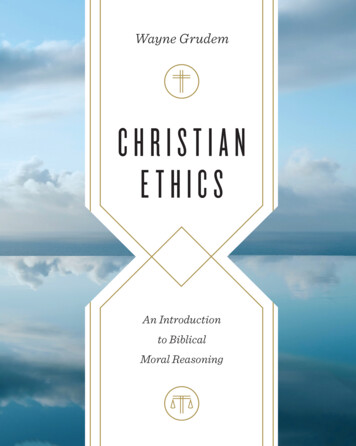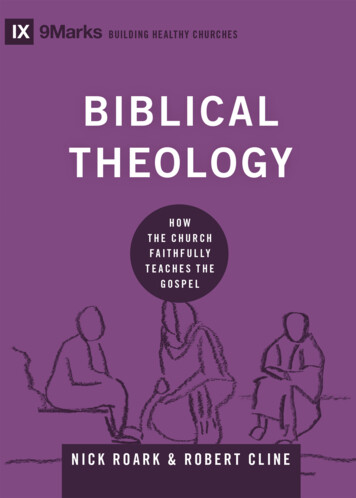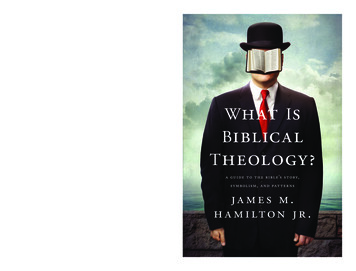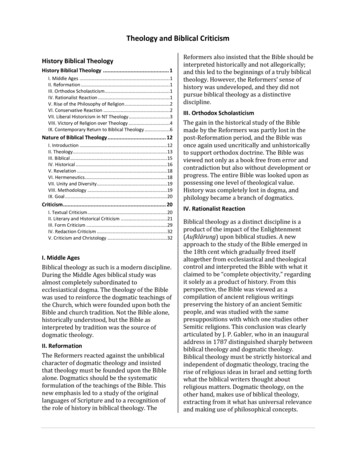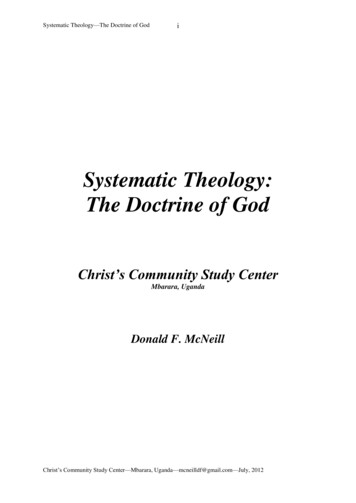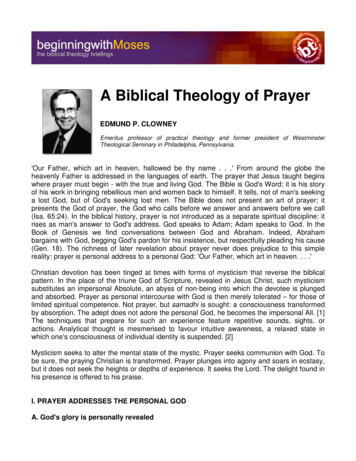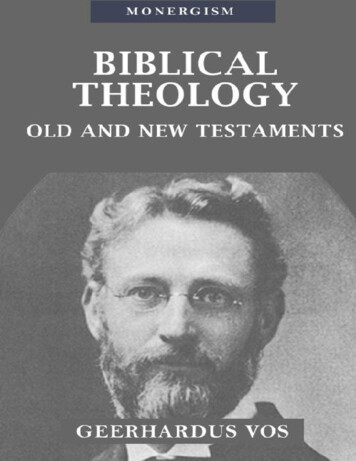
Transcription
Biblical TheologyOld and New Testamentsby Geerhardus VosTABLE OF CONTENTSPrefaceTHE OLD TESTAMENTPART ONE: THE MOSAIC EPOCH OF REVELATION1 INTRODUCTION: THE NATURE AND METHOD OF BIBLICALTHEOLOGY2 THE MAPPING OUT OF THE FIELD OF REVELATION3 THE CONTENT OF PRE-REDEMPTIVE SPECIAL REVELATION4 THE CONTENT OF THE FIRST REDEMPTIVE SPECIALREVELATION5 THE NOACHIAN REVELATION AND THE DEVELOPMENTLEADING UP TO IT6 THE PERIOD BETWEEN NOAH AND THE GREAT PATRIARCHS7 REVELATION IN THE PATRIARCHAL PERIOD8 REVELATION IN THE PERIOD OF MOSES
PART TWO : THE PROPHETIC EPOCH OF REVELATION1 THE PLACEREVELATIONOFPROPHETISM2 THE SAND3 THE HISTORY OF PROPHETISM: CRITICAL THEORIES4 THE MODE OF RECEPTION OF THE PROPHETIC REVELATION5 THE MODE OF COMMUNICATION OF THE PROPHECY6 THE CONTENT OF THE PROPHETIC REVELATIONTHE NEW TESTAMENT1 THE STRUCTURE OF NEW TESTAMENT REVELATION2 REVELATION CONNECTED WITH THE NATIVITY3 REVELATION CONNECTED WITH JOHN THE BAPTIST4 REVELATION IN THE PROBATION OF JESUS5 THE REVELATION OF JESUS' PUBLIC MINISTRYPREFACEIn the words of Thomas Aquinas, Theology a Deo docetur, Deumdocet, ad Deum ducit. After suffering much from the anti-intellectualand anti-doctrinal temper of our times, Theology is perhaps insomewhat better repute now than during the early years of thepresent century. This change of attitude is to be welcomed, even
though it must be confessed that even in conservative Protestantcircles Theology is still far from receiving the attention and respectwhich, as the knowledge of God, it ought to have.The present volume is entitled Biblical Theology—Old and NewTestaments. The term 'Biblical Theology' is really unsatisfactorybecause of its liability to misconstruction. All truly ChristianTheology must be Biblical Theology—for apart from GeneralRevelation the Scriptures constitute the sole material with which thescience of Theology can deal. A more suitable name would be'History of Special Revelation', which precisely describes the subjectmatter of this discipline. Names, however, become fixed by longusage, and the term 'Biblical Theology', in spite of its ambiguity, canhardly be abandoned now.Biblical Theology occupies a position between Exegesis andSystematic Theology in the encyclopaedia of theological disciplines.It differs from Systematic Theology, not in being more Biblical, oradhering more closely to the truths of the Scriptures, but in that itsprinciple of organizing the Biblical material is historical rather thanlogical. Whereas Systematic Theology takes the Bible as a completedwhole and endeavours to exhibit its total teaching in an orderly,systematic form, Biblical Theology deals with the material from thehistorical standpoint, seeking to exhibit the organic growth ordevelopment of the truths of Special Revelation from the primitivepre-redemptive Special Revelation given in Eden to the close of theNew Testament canon.The material presented in this volume has previously been issued atvarious theological institutions in mimeographed form. It is a matterof satisfaction to me that it is being made available to the public in asuitable permanent printed form by the Wm. B. EerdmansPublishing Company. The editing of the material for the press hasbeen done by my son, the Rev. Johannes G. Vos, who studied thiswork as a student at Princeton Theological Seminary and is in heartyagreement with the theological viewpoint of the book. It is my hope
that this volume may help many ministers and theological studentsto attain a deeper appreciation of the wonders of the SpecialRevelation of our God.GEERHARDUS VOSGrand Rapids, Michigan1 September 1948
The Old TestamentPART ONETHE MOSAIC EPOCH OF REVELATIONONE:INTRODUCTION: THE NATURE ANDMETHOD OF BIBLICAL THEOLOGYThe best approach towards understanding the nature of BiblicalTheology and the place belonging to it in the circle of theologicaldisciplines lies through a definition of Theology in general.According to its etymology, Theology is the science concerning God.Other definitions either are misleading, or, when closely examined,are found to lead to the same result. As a frequent instance, thedefinition of Theology as 'the science of religion' may be examined. Ifin this definition 'religion' be understood subjectively, as meaningthe sum-total of religious phenomena or experiences in man, then itis already included in that part of the science of anthropology whichdeals with the psychical life of man. It deals with man, not with God.If, on the other hand, religion be understood objectively, as thereligion which is normal and of obligation for man becauseprescribed by God, then the further question must arise, why Goddemands precisely this and no other religion; and the answer to thiscan be found only in the nature and will of God; therefore ultimately,in thus dealing with religion, we shall find ourselves dealing withGod.
From the definition of Theology as the science concerning Godfollows the necessity of its being based on revelation. In scientificallydealing with impersonal objects we ourselves take the first step; theyare passive, we are active; we handle them, examine them,experiment with them. But in regard to a spiritual, personal beingthis is different. Only in so far as such a being chooses to open upitself can we come to know it. All spiritual life is by its very nature ahidden life, a life shut up in itself. Such a life we can know onlythrough revelation. If this be true as between man and man, howmuch more must it be so as between God and man. The principleinvolved has been strikingly formulated by Paul: 'For who amongmen knoweth the things of a man, save the spirit of the man which isin him? even so the things of God none knoweth, save the Spirit ofGod' [1 Cor. 2:11]. The inward hidden content of God's mind canbecome the possession of man only through a voluntary disclosureon God's part. God must come to us before we can go to Him. ButGod is not a personal spiritual being in general. He is a Beinginfinitely exalted above our highest conception. Suppose it werepossible for one human spirit to penetrate directly into anotherhuman spirit: it would still be impossible for the spirit of man topenetrate into the Spirit of God. This emphasizes the necessity ofGod's opening up to us the mystery of His nature before we canacquire any knowledge concerning Him. Indeed, we can go one stepfarther still. In all scientific study we exist alongside of the objectswhich we investigate. But in Theology the relation is reversed.Originally God alone existed. He was known to Himself alone, andhad first to call into being a creature before any extraneousknowledge with regard to Him became possible. Creation thereforewas the first step in the production of extra-divine knowledge.Still a further reason for the necessity of revelation preceding allsatisfactory acquaintance with God is drawn from the abnormal statein which man exists through sin. Sin has deranged the originalrelation between God and man. It has produced a separation wherepreviously perfect communion prevailed. From the nature of the caseevery step towards rectifying this abnormality must spring from
God's sovereign initiative. This particular aspect, therefore, of theindispensableness of revelation stands or falls with the recognition ofthe fact of sin.DIVISION OF THEOLOGY INTO FOUR GREAT DEPARTMENTSThe usual treatment of Theology distinguishes four departments,which are named Exegetical Theology, Historical Theology,Systematic Theology and Practical Theology. The point to beobserved for our present purpose is the position given ExegeticalTheology as the first among these four. This precedence is due to theinstinctive recognition that at the beginning of all Theology lies apassive, receptive attitude on the part of the one who engages in itsstudy. The assumption of such an attitude is characteristic of all trulyexegetical pursuit. It is eminently a process in which God speaks andman listens. Exegetical Theology, however, should not be regarded asconfined to Exegesis. The former is a larger whole of which the latteris indeed an important part, but after all only a part. ExegeticalTheology in the wider sense comprises the following disciplines:(a) the study of the actual content of Holy Scripture;(b) the inquiry into the origin of the several Biblical writings,including the identity of the writers, the time and occasion ofcomposition, dependence on possible sources, etc. This is calledIntroduction, and may be regarded as a further carrying out of theprocess of Exegesis proper;(c) the putting of the question of how these several writings came tobe collected into the unity of a Bible or book; this part of the processbears the technical name of Canonics;(d) the study of the actual self-disclosures of God in time and spacewhich lie back of even the first committal to writing of any Biblicaldocument, and which for a long time continued to run alongside ofthe inscripturation of revealed material; this last-named procedure iscalled the study of Biblical Theology.
The order in which the four steps are here named is, of course, theorder in which they present themselves successively to theinvestigating mind of man. When looking at the process from thepoint of view of the divine activity the order requires to be reversed,the sequence here being(a) the divine self-revelation;(b) the committal to writing of the revelation-product;(c) the gathering of the several writings thus produced into the unityof a collection;(d) the production and guidance of the study of the content of theBiblical writings.DEFINITION OF BIBLICAL THEOLOGYBiblical Theology is that branch of Exegetical Theology which dealswith the process of the self-revelation of God deposited in the Bible.In the above definition the term 'revelation' is taken as a noun ofaction. Biblical Theology deals with revelation as a divine activity,not as the finished product of that activity. Its nature and method ofprocedure will therefore naturally have to keep in close touch with,and so far as possible reproduce, the features of the divine workitself. The main features of the latter are the following:[1] The historic progressiveness of the revelation-processIt has not completed itself in one exhaustive act, but unfolded itselfin a long series of successive acts. In the abstract, it mightconceivably have been otherwise. But as a matter of fact this couldnot be, because revelation does not stand alone by itself, but is (so faras Special Revelation is concerned) inseparably attached to anotheractivity of God, which we call Redemption. Now redemption couldnot be otherwise than historically successive, because it addresses
itself to the generations of mankind coming into existence in thecourse of history. Revelation is the interpretation of redemption; itmust, therefore, unfold itself in instalments as redemption does. Andyet it is also obvious that the two processes are not entirely coextensive, for revelation comes to a close at a point whereredemption still continues. In order to understand this, we must takeinto account an important distinction within the sphere ofredemption itself. Redemption is partly objective and central, partlysubjective and individual. By the former we designate thoseredeeming acts of God, which take place on behalf of, but outside of,the human person. By the latter we designate those acts of Godwhich enter into the human subject. We call the objective actscentral, because, happening in the centre of the circle of redemption,they concern all alike, and are not in need of, or capable of,repetition. Such objective-central acts are the incarnation, theatonement, the resurrection of Christ. The acts in the subjectivesphere are called individual, because they are repeated in eachindividual separately. Such subjective-individual acts areregeneration, justification, conversion, sanctification, glorification.Now revelation accompanies the process of objective-centralredemption only, and this explains why redemption extends furtherthan revelation. To insist upon its accompanying subjectiveindividual redemption would imply that it dealt with questions ofprivate, personal concern, instead of with the common concerns ofthe world of redemption collectively. Still this does not mean that thebeliever cannot, for his subjective experience, receive enlightenmentfrom the source of revelation in the Bible, for we must rememberthat continually, alongside the objective process, there was going onthe work of subjective application, and that much of this is reflectedin the Scriptures. Subjective-individual redemption did not firstbegin when objective-central redemption ceased; it existed alongsideof it from the beginning.There lies only one epoch in the future when we may expectobjective-central redemption to be resumed, viz., at the SecondComing of Christ. At that time there will take place great redemptive
acts concerning the world and the people of God collectively. Thesewill add to the volume of truth which we now possess.[2] The actual embodiment of revelation in historyThe process of revelation is not only concomitant with history, but itbecomes incarnate in history. The facts of history themselves acquirea revealing significance. The crucifixion and resurrection of Christare examples of this. We must place act-revelation by the side ofword-revelation. This applies, of course, to the great outstanding actsof redemption. In such cases redemption and revelation coincide.Two points, however, should be remembered in this connection:first, that these two-sided acts did not take place primarily for thepurpose of revelation; their revelatory character is secondary;primarily they possess a purpose that transcends revelation, having aGod-ward reference in their effect, and only in dependence on this aman-ward reference for instruction. In the second place, such actrevelations are never entirely left to speak for themselves; they arepreceded and followed by word-revelation. The usual order is: firstword, then the fact, then again the interpretative word. The OldTestament brings the predictive preparatory word, the Gospelsrecord the redemptive-revelatory fact, the Epistles supply thesubsequent, final interpretation.[3] The organic nature of the historic process observable inrevelationEvery increase is progressive, but not every progressive increasebears an organic character. The organic nature of the progression ofrevelation explains several things. It is sometimes contended that theassumption of progress in revelation excludes its absolute perfectionat all stages. This would actually be so if the progress were nonorganic. The organic progress is from seed-form to the attainment of
full growth; yet we do not say that in the qualitative sense the seed isless perfect than the tree. The feature in question explains furtherhow the soteric sufficiency of the truth could belong to it in its firststate of emergence: in the seed-form the minimum of indispensableknowledge was already present. Again, it explains how revelationcould be so closely determined in its onward movement by theonward movement of redemption. The latter being organicallyprogressive, the former had to partake of the same nature. Whereredemption takes slow steps, or becomes quiescent, revelationproceeds accordingly. But redemption, as is well known, is eminentlyorganic in its progress. It does not proceed with uniform motion, butrather is 'epochal' in its onward stride. We can observe that wheregreat epoch-making redemptive acts accumulate, there themovement of revelation is correspondingly accelerated and itsvolume increased. Still further, from the organic character ofrevelation we can explain its increasing multiformity, the latter beingeverywhere a symptom of the development of organic life. There ismore of this multiformity observable in the New Testament than inthe Old, more in the period of the prophets than in the time ofMoses.Some remarks are in place here in regard to a currentmisconstruction of this last-mentioned feature. It is urged that thediscovery of so considerable an amount of variableness anddifferentiation in the Bible must be fatal to the belief in itsabsoluteness and infallibility. If Paul has one point of view and Peteranother, then each can be at best only approximately correct. Thiswould actually follow, if the truth did not carry in itself amultiformity of aspects. But infallibility is not inseparable from dulluniformity. The truth is inherently rich and complex, because God isso Himself. The whole contention ultimately rests on a wrong view ofGod's nature and His relation to the world, a view at bottomDeistical. It conceives of God as standing outside of His own creationand therefore having to put up for the instrumentation of Hisrevealing speech with such imperfect forms and organs as it offersHim. The didactic, dialectic mentality of Paul would thus become a
hindrance for the ideal communication of the message, no less thanthe simple, practical, untutored mind of Peter. From the standpointof Theism the matter shapes itself quite differently. The truth havinginherently many sides, and God having access to and control of allintended organs of revelation, shaped each one of these for theprecise purpose to be served. The Gospel having a precise, doctrinalstructure, the doctrinally-gifted Paul was the fit organ for expressingthis, because his gifts had been conferred and cultivated in advancewith a view to it.[4] The fourth aspect of revelation determinative of the study ofBiblical Theology consists in its practical adaptabilityGod's self-revelation to us was not made for a primarily intellectualpurpose. It is not to be overlooked, of course, that the truly piousmind may through an intellectual contemplation of the divineperfections glorify God. This would be just as truly religious as theintensest occupation of the will in the service of God. But it wouldnot be the full-orbed religion at which, as a whole, revelation aims. Itis true, the Gospel teaches that to know God is life eternal. But theconcept of 'knowledge' here is not to be understood in its Hellenicsense, but in the Shemitic sense. According to the former, 'to know'means to mirror the reality of a thing in one's consciousness. TheShemitic and Biblical idea is to have the reality of somethingpractically interwoven with the inner experience of life. Hence 'toknow' can stand in the Biblical idiom for 'to love', 'to single out inlove'. Because God desires to be known after this fashion, He hascaused His revelation to take place in the milieu of the historical lifeof a people. The circle of revelation is not a school, but a 'covenant'.To speak of revelation as an 'education' of humanity is a rationalisticand utterly un-scriptural way of speaking. All that God disclosed ofHimself has come in response to the practical religious needs of Hispeople as these emerged in the course of history.
THE VARIOUS THINGS SUCCESSIVELY DESIGNATED BY THENAME OF BIBLICAL THEOLOGYThe name was first used to designate a collection of proof-textsemployed in the study of Systematic Theology. Next it wasappropriated by the Pietists to voice their protest against ahyperscholastic method in the treatment of Dogmatics. Of course,neither of these two usages gave rise to a new distinct theologicaldiscipline. This did not happen until a new principle of treatment,marking it off from the disciplines already existing, was introduced.The first to do this was J. P. Gabler in his treatise De justo discriminetheologiae biblicae et dogmaticae. Gabler correctly perceived that thespecific difference of Biblical Theology lies in its historical principleof treatment. Unfortunately both the impulse of the perception andthe manner of its application were influenced by the Rationalism ofthe school to which he belonged. The chief characteristic of thisschool was its disrespect for history and tradition and thecorresponding worship of Reason as the sole and sufficient source ofreligious knowledge. A distinction was drawn between (a) pastbeliefs and usages recorded in the Bible as a matter of history and (b)what proved demonstrable by Reason. The former was a priorirejected as unauthoritative, while the latter was received as truth—not, however, because found in the Bible, but because in agreementwith the deliverances of Reason. If the question was put, what usecould then possibly be served by its presentation in the Bible, theanswer was given that at an earlier stage of development men werenot yet sufficiently acquainted with Reason to base on it theirreligious convictions and practice, and consequently Godaccommodated Himself to the ancient method of basing belief onexternal authority, a method now superseded.It is important to observe that this so-called Rationalismus Vulgariswas not (and, so far as it still survives, is not) a purely philosophicalor epistemological principle, but has a specifically religiouscolouring. Rationalism has so long and so violently attacked religionthat it cannot seem amiss to turn the tables and for a moment
criticize rationalism from the view-point of religion. The main pointto notice is its undue self-assertiveness over against God in thesphere of truth and belief. This is a defect in religious endowment.Reception of truth on the authority of God is an eminently religiousact. Belief in the inspiration of Scripture can be appraised as an act ofworship under given circumstances. This explains why rationalismhas by preference asserted itself in the field of religion even morethan in that of pure philosophy. This is because in religion the sinfulmind of man comes most directly face to face with the claims of anindependent, superior authority. Closely looked at, its protest againsttradition is a protest against God as the source of tradition, and itswhole mode of treatment of Biblical Theology aims not at honouringhistory as the form of tradition, but at discrediting history andtradition. Further, rationalism is defective, ethically considered, inthat it shows a tendency towards glorification of its own present (thatis, at bottom, of itself) over against the future no less than the past. Itreveals a strong sense of having arrived at the acme of development.The glamour of unsurpassability in which rationalism usually seesitself is not calculated to make it expect much from God in the future.In this attitude, the religious fault of self-sufficiency stands out evenmore pronouncedly than in the attitude towards the past.It was formerly considered a merit to have stressed the importance oftracing the truth historically, but when this was done with a lack offundamental piety it lost the right of calling itself theology. Therationalistic brand of Biblical Theology, at the same time that itstresses the historical, declares its product religiously worthless.To define the issue between ourselves and this type of treatmentsharply, we should remember, that it is not a question of theapprehensive function of the reason in regard to religious truth. Manis psychically so constructed that nothing can enter into hisknowledge except through the gateway of the reason. This is so true,that it applies equally to the content of Special Revelation as to theingress of truth from any other source. Nor is it a question about thelegitimate functioning of the reason in supplying the mind of man
with the content of natural revelation. Still further, reason has itsproper place in the thinking through and systematizing of thecontent of Special Revelation. But the recognition of all this is notidentical with nor characteristic of what we technically callrationalism. The diagnosis of the latter lies in the atmosphere ofirreligion and practical disdain of God which it carries with itselfwherever appearing. The main fault to be found with people of thiskind is that to the pious mind their whole outlook towards God andHis world appears uncongenial because lacking in the most primarysense the sensorium of religion.Ever since its birth in this rationalistic environment BiblicalTheology has been strongly affected, not only in the way in whichphilosophical currents have touched Theology in general, but in aspecial manner to which its nature especially lays it open. This isshown in the extent to which, at the present time, the treatment ofBiblical Theology is influenced by the philosophy of evolution. Thisinfluence is discernible in two directions. In the first place, thequalitative advancement found by the hypothesis of evolution in theworld-process is extended to the emergence of religious truth. Itbecomes an advance, not only from the lower to the higher, but fromthe barbarous and primitive to the refined and civilized, from thefalse to the true, from the evil to the good. Religion, it is held, beganwith animism; next came polytheism, then monolatry, thenmonotheism. Such a view, of course, excludes revelation in everylegitimate sense of the word. Making all things relative, it leaves noroom for the absoluteness of the divine factor.In the second place, the philosophy of evolution belongs to the familyof positivism. It teaches that nothing can be known but phenomena,only the impressionistic side of the world, not the interior objectivereality, the so-called 'things in themselves'. Such things as God, thesoul, immortality, a future life, etc., cannot enter into humanknowledge, which in fact is no knowledge in the old solid sense.Consequently all these objective verities come to be regarded as lyingbeyond the province of Theology. If the name Theology is still
retained, it is as a misnomer for a classification and discussion ofreligious phenomena. The question is no longer as to what is true,but simply as to what has been believed and practised in the past.Alongside of this general camouflage of the science of religion underthe name of Theology, and inseparable from it, runs the turninginside out of Biblical Theology in particular. This becomes thephenomenology of the religion recorded in the literature of the Bible.GUIDING PRINCIPLESOver against these perversive influences it is of importance clearly tolay down the principles by which we propose to be guided in ourtreatment of the matter. These are:(a) the recognition of the infallible character of revelation as essentialto every legitimate theological use made of this term. This is of theessence of Theism. If God be personal and conscious, then the ininference is inevitable that in every mode of self-disclosure He willmake a faultless expression of His nature and purpose. He willcommunicate His thought to the world with the stamp of divinity onit. If this were otherwise, then the reason would have to be sought inHis being in some way tied up in the limitations and relativities ofthe world, the medium of expression obstructing His intercoursewith the world. Obviously the background of such a view is notTheism but pantheism.(b) Biblical Theology must likewise recognize the objectivity of thegroundwork of revelation. This means that real communicationscame from God to man ab extra. It is unfair to pass this off with acontemptuous reference to the 'dictation' view. There is nothingundignified in dictation, certainly not as between God and man.Besides, it is unscientific, for the statements of the recipients ofrevelation show that such a process not seldom took place.Our position, however, does not imply that all revelation came afterthis objective fashion. There is an ingredient which may properly be
called 'subjective revelation'. By this is meant the inward activity ofthe Spirit upon the depths of human sub-consciousness causingcertain God-intended thoughts to well up therefrom. The Psalmsoffer examples of this kind of revelation, and it also occurs in thePsalmodic pieces found here and there in the prophets. Althoughbrought up through a subjective channel, we none the less mustclaim for it absolute divine authority; otherwise it could not properlybe called revelation. In this subjective form revelation andinspiration coalesce. We must, however, be on our guard against themodern tendency to reduce all revelation in the Scriptures to thiscategory of the ab intra. That is usually intended to depriverevelation of its infallibility. A favourite form is to confine revelationproper to the bare acts of self-disclosure performed by God, and thento derive the entire thought-content of the Bible from humanreflection upon these acts. Such a theory, as a rule, is made a coverfor involving the whole teaching of the Bible in the relativity ofpurely human reflection, whose divine provenience cannot anylonger be verified, because there is nothing objective left to verify itby.The belief in the joint-occurrence of objective and subjectiverevelation is not a narrow or antiquated position; it is in reality theonly broad-minded view, since it is willing to take into account all thefacts. The offence at 'dictation' frequently proceeds from an underestimate of God and an over-estimate of man. If God condescends togive us a revelation, it is for Him and not for us a priori to determinewhat forms it will assume. What we owe to the dignity of God is thatwe shall receive His speech at full divine value.(c) Biblical Theology is deeply concerned with the question ofinspiration. All depends here on what we posit as the object withwhich our science deals. If its object consist in the beliefs andpractices of men in the past, then obviously it is of no importancewhether the subject matter be considered as true in any other orhigher sense than that of a reliable record of things once prevailing,no matter whether inherently true or not. A Biblical Theology thus
conceived ought to classify itself with Historical Theology, not withExegetical Theology. It professes to be a History of Doctrine forBiblical times. It treats Isaiah as it would treat Augustine, the sole
Whereas Systematic Theology takes the Bible as a completed whole and endeavours to ex hibit its total teaching in a n orderly, systematic form, Biblical Theology deals with the materia l from the historical standpoint, seeking to exhibit the organic growth or development o
